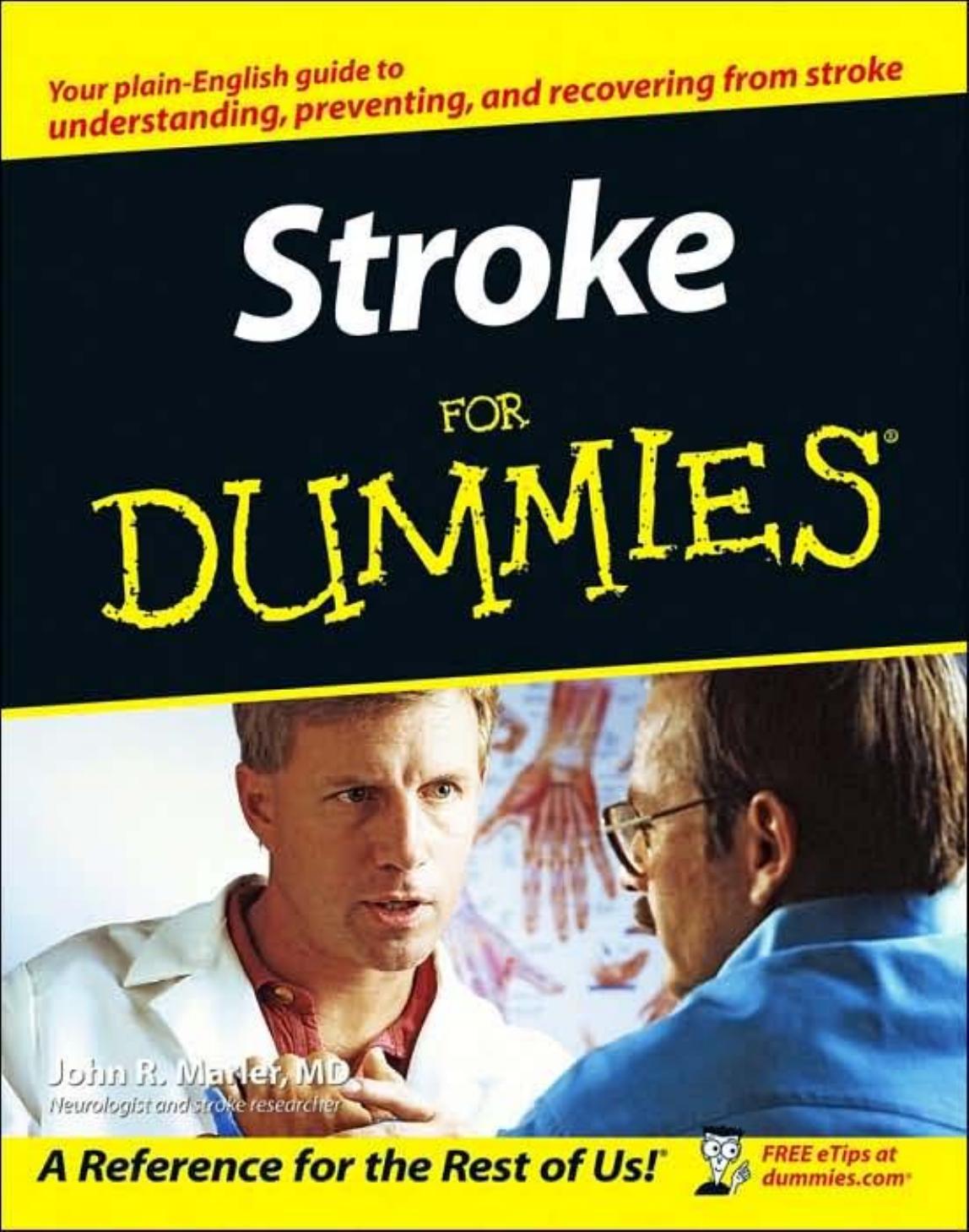Stroke For Dummies by John R. Marler

Author:John R. Marler
Language: eng
Format: epub, pdf
Publisher: Wiley
Zeroing in on what you can change
Other risks are treatable or preventable. Here’s a quick overview of these factors before I examine them more closely and explore how to eliminate, reduce, or treat them.
Hypertension: High blood pressure, the most important factor determining the likelihood that you will have a stroke, is examined in detail in Chapter 8.
High blood lipids and cholesterol: This issue is so complicated, I’ve devoted an entire chapter (Chapter 9) to blood fat and cholesterol and how to combat its devastating effect on the blood vessels.
Heart and vascular disease: The numbers tell the story. Studies support that individuals who have heart disease are twice as likely to suffer a stroke as those who don’t. The conditions vary and can often be controlled through medication, as well as diet and lifestyle changes.
Smoking tobacco: Smoking cigarettes increases your chances of stroke by a factor of four. Plus it increases your chances of heart attack and emphysema as well. This condition, however, has one of the most effective, if not most difficult, treatments: Simply stop doing it! Stopping smoking for a year returns you to the same stroke risk as a nonsmoker your own age.
Diabetes: Unfortunately, diabetes can’t be eliminated, but it can be controlled with medication. The accompanying conditions of high blood pressure and obesity can also be controlled in order to reduce risk.
Obesity: Individuals who are obese are more likely to have hypertension, diabetes, high cholesterol, and heart disease. Control is achieved through diet and exercise.
Oral contraceptives and estrogen replacement: Both these common drugs increase the tendency of blood to clot. Hence, the increased risk of white strokes caused by blood clots. Doctors were surprised when they learned that birth-control pills, especially when combined with cigarette smoking, also increased a woman’s chance of red stroke from rupture of a subarachnoid hemorrhage.
Drug and alcohol abuse: Heavy drinking increases your risk of heart disease and stroke. Light and moderate drinking are associated with a decreased rate of both stroke and heart disease. These facts have been known for years, but it hasn’t been confirmed by a clinical trial that adding light or moderate drinking to a nondrinker’s life will decrease stroke risk. Experts haven’t really figured this one out. What’s clear is that if you are already having a glass of wine with your dinner every night, there is no apparent reason to stop.
Download
This site does not store any files on its server. We only index and link to content provided by other sites. Please contact the content providers to delete copyright contents if any and email us, we'll remove relevant links or contents immediately.
The DNA Book by DK(622)
The End of Food Allergy by Kari Nadeau MD PhD & Sloan Barnett(606)
Extra Life by Steven Johnson(526)
Unlocking Eden: Revolutionize Your Health, Maximize Your Immunity, Restore Your Vitality by Belt Daniel & Horn Joe(514)
Your Brain Is Always Listening by Dr. Daniel G. Amen(511)
The Hospital by Brian Alexander(487)
The Covid Survival Guide: What the Virus Is, How to Avoid It, How to Survive It by Rowell David(480)
The Spike by Mark Humphries;(462)
The Low-FODMAP IBS Solution Plan and Cookbook by Rachel Pauls(454)
How to Sleep by Rafael Pelayo(453)
Better Living Through Neurochemistry - A guide to the optimization of serotonin, dopamine and the neurotransmitters that color your world by James Lee(434)
Thrivers by Michele Borba Ed. D(426)
The Big Book of Baby Names by Marissa Charles(419)
Linda Goodman's Love Signs by Linda Goodman(416)
Stroke For Dummies by John R. Marler(403)
The Miracle Pill by Peter Walker(401)
Immunity by Jenna Macciochi(397)
The Hashimoto's AIP Cookbook: Easy Recipes for Thyroid Healing on the Paleo Autoimmune Protocol by Emily Kyle MS RDN CLT HCP & Phil Kyle Chef(385)
Pandemics: A Very Short Introduction (Very Short Introductions) by Christian W. McMillen(384)
